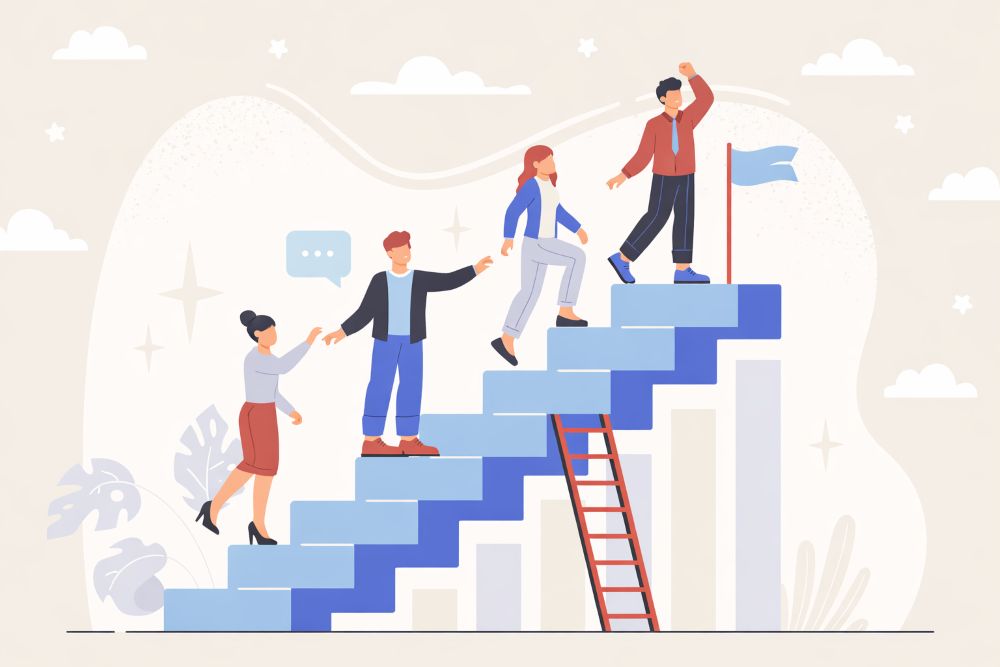MIN.jpg)
The future of work is here, and at the center of this transformation is artificial intelligence (AI). As businesses embrace digital transformation, AI is playing an increasingly pivotal role in People Operations (People Ops), redefining how organizations manage talent, improve employee experiences, and make data-driven decisions.
In 2025, AI is no longer just a buzzword—it’s an essential tool for HR professionals seeking to streamline processes, reduce human error, and enhance the overall employee lifecycle. From recruiting and onboarding to performance management and employee engagement, AI is revolutionizing every aspect of People Ops. Let’s dive into how AI is changing the game in HR and what this means for businesses moving forward.
Recruiting is one of the most time-consuming and high-stakes tasks in HR. Companies are constantly looking for ways to attract top talent while reducing the time-to-hire. AI is playing a crucial role in modernizing the hiring process.
AI-powered tools now assist HR teams in screening resumes, scheduling interviews, and even conducting initial assessments through chatbots. These tools can analyze vast amounts of data from candidates' resumes and social profiles, identifying the best-fit applicants based on a combination of skills, experiences, and cultural fit. With the power of AI, the time spent on manual resume screening and initial interviews is dramatically reduced, allowing HR teams to focus on high-value tasks like candidate engagement and strategic planning.
Additionally, AI helps minimize unconscious bias in hiring by focusing purely on candidate qualifications, rather than subjective factors. This fosters a more inclusive hiring process, ensuring that companies attract a more diverse workforce and make more objective decisions.
Once the hiring process is complete, it’s time for the onboarding process to begin. AI is making this experience smoother, more personalized, and more efficient. Instead of manually entering employee information or chasing down paperwork, AI can automate these tasks, ensuring that new hires are set up quickly with everything they need to be productive on day one.
From automatically assigning training modules to integrating with IT systems to provision hardware and software, AI streamlines the onboarding journey. Personalized chatbots guide new employees through the process, answering questions, providing important information, and even offering resources for a successful start. This reduces the administrative burden on HR teams and ensures that every new hire has a positive onboarding experience, no matter how large the organization grows.
Employee engagement is a critical driver of organizational success. In 2025, AI tools are being used to analyze employee sentiment in real time, offering valuable insights into how employees feel about their roles, managers, and the company as a whole. AI-powered platforms can track employee feedback from surveys, social media posts, and even day-to-day interactions to provide HR teams with actionable insights.
By using AI to monitor employee engagement, HR professionals can identify early signs of dissatisfaction, burnout, or disengagement, allowing them to intervene proactively and address potential issues before they escalate. This data-driven approach helps create a more personalized and supportive work environment, increasing retention and fostering a culture of continuous improvement.
AI is also helping companies offer more tailored employee development programs. By analyzing performance data and identifying skill gaps, AI can recommend specific training courses or career development paths that are aligned with both the employee’s aspirations and the company’s needs. This results in a more engaged and productive workforce, with employees who feel supported and valued in their career growth.
Traditional performance management systems—focused on annual reviews and static feedback—are being replaced by more dynamic, real-time performance tracking. AI-powered platforms offer employees and managers the ability to give and receive feedback continuously, fostering a culture of ongoing improvement.
By integrating AI into performance management, HR teams can gain a clearer picture of employee performance across multiple touchpoints, such as project completions, peer reviews, and manager assessments. AI-driven analytics can identify trends, flag areas for improvement, and even suggest personalized coaching or training opportunities. This level of granularity ensures that employees are always aware of their performance and can take proactive steps to improve, rather than waiting for a once-a-year review.
One of the most powerful ways AI is transforming People Ops is through predictive analytics. With AI, HR teams can analyze vast amounts of historical data—ranging from employee performance to turnover rates—to predict future trends and make data-driven decisions. For example, AI can help identify employees who might be at risk of leaving based on behavioral patterns, such as engagement levels, performance scores, and even external factors like industry trends.
This predictive capability enables HR teams to be more proactive in addressing potential challenges. Whether it’s identifying top talent, forecasting hiring needs, or mitigating the risk of employee turnover, AI equips People Ops teams with the tools they need to make smarter, more strategic decisions that positively impact business outcomes.
Employee wellness is another area where AI is making significant strides. With the increasing focus on mental health and work-life balance in 2025, AI tools are helping companies support their employees’ well-being more effectively. AI-driven wellness platforms can track various employee health metrics, such as stress levels, work hours, and engagement with wellness programs, providing HR teams with insights into the overall health of the workforce.
By analyzing this data, AI can suggest personalized wellness initiatives, recommend flexible work options, and even send reminders for mental health breaks. AI’s ability to scale wellness initiatives across large, diverse teams ensures that every employee has access to the support they need to thrive.
AI is no longer a luxury—it’s a necessity for modern People Operations. As businesses navigate the challenges of 2025, AI is proving to be an invaluable ally in creating a more efficient, engaging, and data-driven HR function. From automated recruiting and onboarding to performance management and employee wellness, AI is revolutionizing the way HR professionals work.
As the adoption of AI continues to grow, HR teams will be empowered to focus on what truly matters: creating exceptional employee experiences, driving business success, and fostering a culture of continuous growth and innovation. Is your organization ready to embrace the future of People Ops? The power of AI is at your fingertips.



December 24, 2025
Career
It's 2026, and career ladders are breaking down as flatter organizations, faster skill change, and AI reduce traditional promotion paths. Research shows high performers now grow by expanding scope, building in-demand skills, moving laterally, and earning trust through outcomes—not by waiting for titles. Employees must manage careers as portfolios of skills and impact, while PeopleOps and HR must redefine growth around scope and mobility, enable managers in leaner orgs, and ensure fair access to opportunity or risk losing top talent.
Career


November 28, 2024
Compliance
Upcoming 2025 employment law changes in the U.S. and Canada will significantly impact businesses, but Rippling’s automated compliance tools and robust HR features can help organizations stay ahead and confidently adapt to evolving regulations.
Compliance


December 10, 2024
Culture
Company culture starts from the first day you welcome new employees to your firm.
Culture